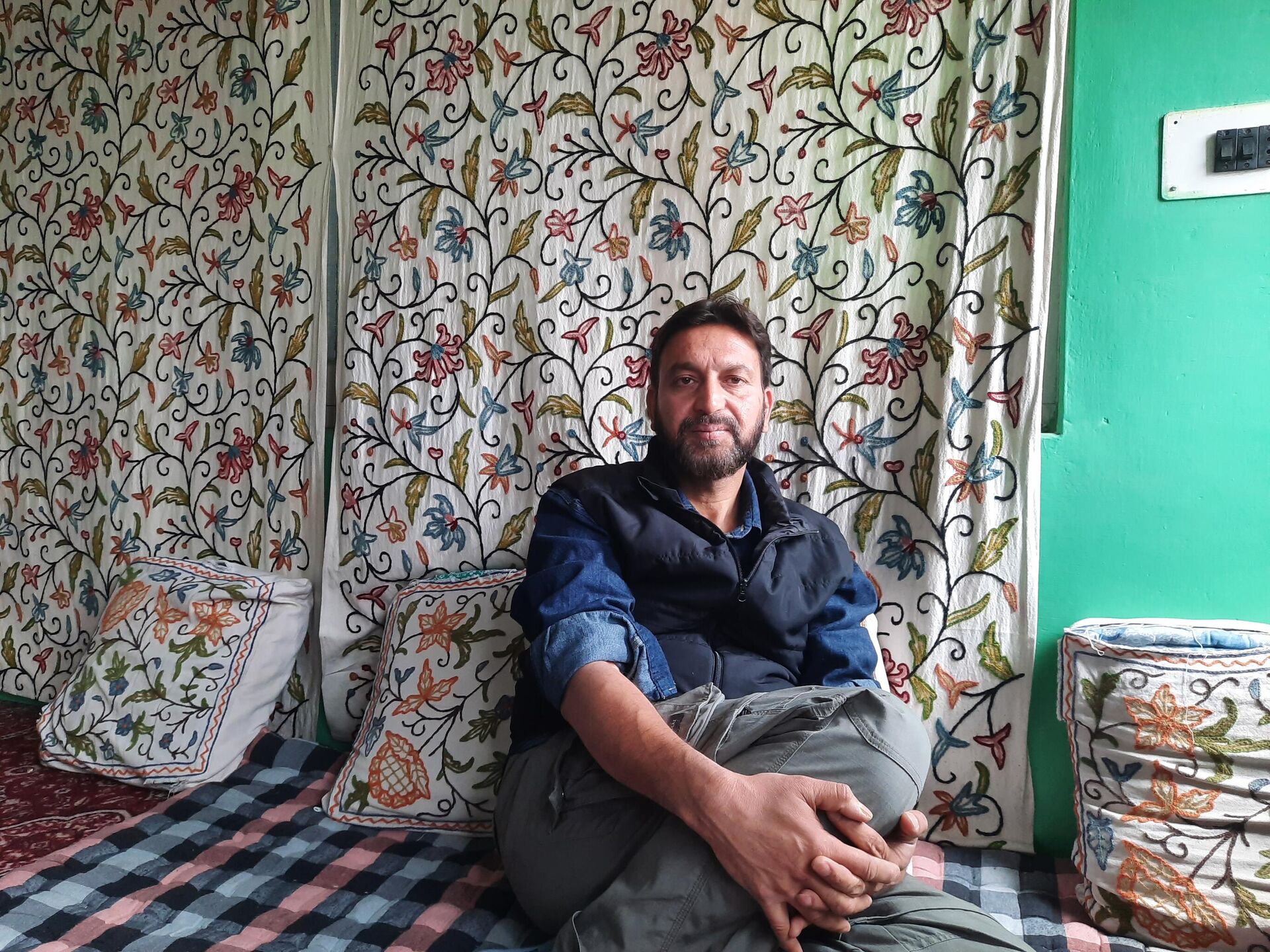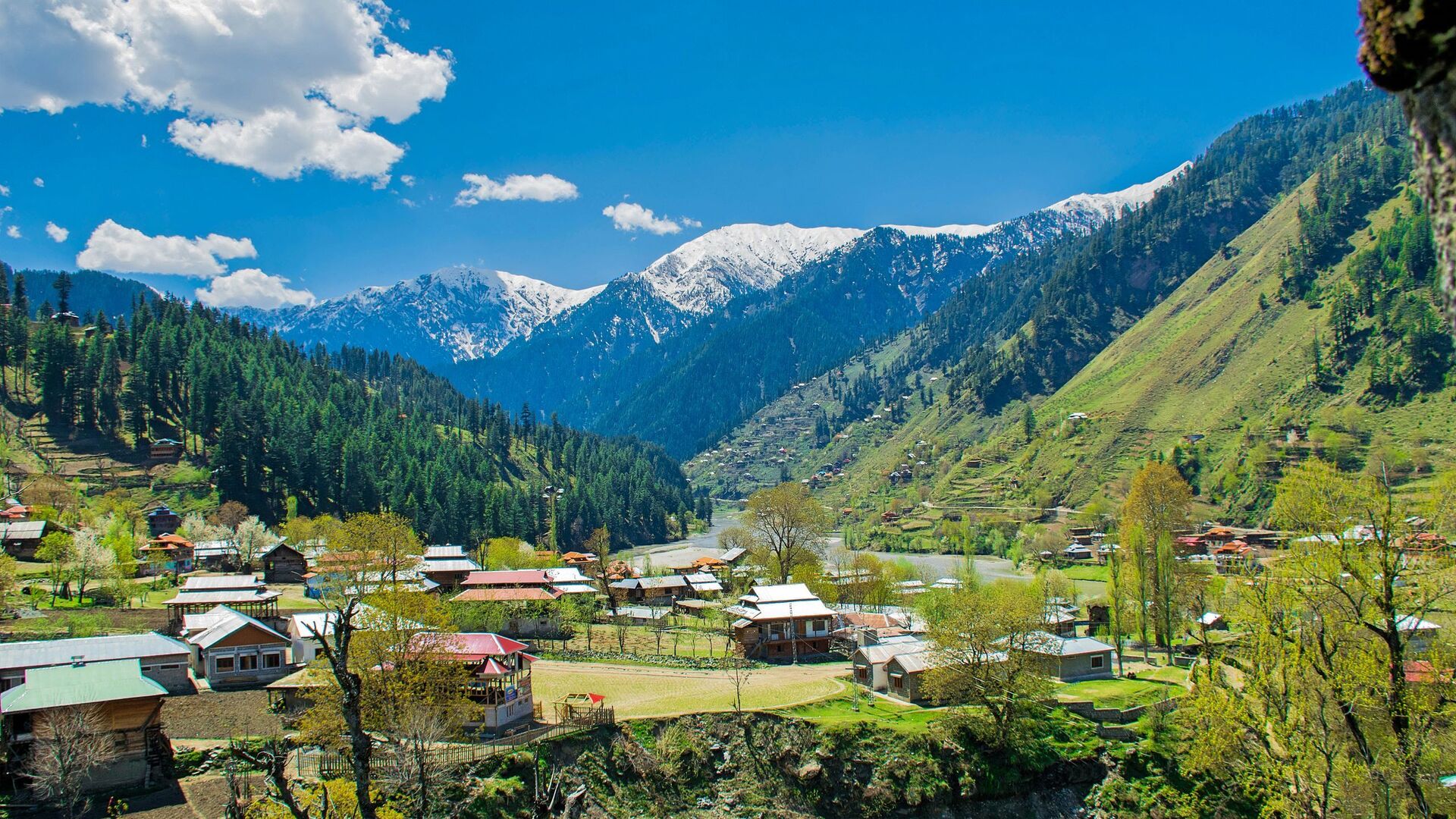https://sputnikglobe.com/20220421/mass-tourism-may-wreck-kashmir-take-lessons-from-russia-central-asia-environmentalist-says-1094905395.html
Mass Tourism May Wreck Kashmir, Take Lessons From Russia, Central Asia, Environmentalist Says
Mass Tourism May Wreck Kashmir, Take Lessons From Russia, Central Asia, Environmentalist Says
Sputnik International
The Kashmir region has seen over 350,000 tourist arrivals in the first four months of 2022. While the local administration of Jammu and Kashmir is on a spree... 21.04.2022, Sputnik International
2022-04-21T04:00+0000
2022-04-21T04:00+0000
2022-04-21T04:00+0000
kashmir
conflict
tourism
environment
interviews
https://cdn1.img.sputnikglobe.com/img/07e5/07/0c/1083367619_0:134:2560:1574_1920x0_80_0_0_2978d6f2406bd6458f8a979eb13b6a97.jpg
The Jammu and Kashmir region is witnessing a massive influx of tourists this year, leaving local authorities and industries linked to tourism delighted. However, Kashmir's leading Right to Information activist and environmentalist Ghulam Rasool has raised concerns about its likely impact. He is worried about the likely damage that such a mass influx of tourists may cause to this environmentally fragile Himalayan region.In an interview with Sputnik, Rasool stressed the need for promoting traditional business sectors of Kashmir like agriculture, and said policy makers should take a cue from Russia and Central Asia on how to protect the environment. The environmentalist, a member of the International Community Conservation Consortium, also advocates the Kashmir region's inclusion in listed "Territories of life": the territories and areas conserved on behalf of indigenous people and local communities. Sputnik: As per government statistics, the horticulture sector provides employment to over one third of the Kashmiri population. But the Jammu and Kashmir government has made it clear that it's deeply invested in making tourism a massive industry, perhaps even bigger than horticulture, to ensure employment for millions of people. Do you think it's a good idea to leave behind traditional business sectors such as horticulture?Ghulam Rasool: There is a notion that horticulture produces employment for one third of Kashmir’s population. But we believe the horticulture and agriculture sectors impact 70-78% of the employment here [in Kashmir].Our mountains and rivers are extremely important for both these sectors. But, unfortunately, the government is only publicising tourism. Across the world, it has been seen how mass tourism is destructive for water, forests, mountain ecology, and wildlife.Out of the 7%, only a few families benefit, not the entire local population. The government should stop mass tourism and promote the agriculture and horticulture sectors.Sputnik: How do you view government measures undertaken to revive tourism in Kashmir? What are their pros and cons?Ghulam Rasool: In the last few decades, when the world realised that mass tourism is not good for ecological health, people started promoting nature-based tourism. Community-based nature tourism is the solution that can protect local ecology and promote the local economy.Local cuisine, agriculture, horticulture, culture and heritage also get promoted.Under the mass tourism plan [in Kashmir], the government plans to make 76 new [tourist] destinations and is planning to involve private companies in the development.The government is claiming that they are taking good steps. But, unfortunately, the forest department, forest-related institutions and environmental science departments are not being taken on board.There is no study of the negative impact of tourism. The people who provide horseback rides to tourists earn a paltry sum of 200 rupees (around $3) but their property rights are being taken away [due to mass tourism]. There is a solution to all this. The government recently introduced a Forest Rights Act which essentially advocates community control over natural resources.Sputnik: Can you share an example of a country or tourist destination where the natural environment was hurt due to mass tourism?Ghulam Rasool: One does not have to go too far. We saw what happened in Himachal Pradesh and Uttarakhand [Indian states with glaciers]. The unnecessary roads that are being built result in soil erosion. The mountain balance gets disturbed due to the big machines, choppers, vehicles, or cable cars and also due to the increasing amount of human intervention, which includes troop deployment.The unnecessary roads that are being built under PMGSY (Pradhan Mantri Gram Sadak Yojana, or, the Prime Minister's Rural Road Development programme to provide good all-weather road connectivity), have their own ill impacts [on the environment].Look at Russia and Central Asia. They put an end to this [heavy construction in fragile ecologies] because they [governments] realised the ill-effects [on environment]. This [heavy construction] has given nothing to our ecology except destruction.Sputnik: In what ways is mass tourism affecting Kashmir’s ecology?Ghulam Rasool: First, we are seeing a decline in the water resources of Pahalgam, Gulmarg and Sonmarg (prominent hill stations in Kashmir). Then, we are also seeing that the pastoral communities of these places being pushed out.We are witnessing a decrease in the production of organic meat and an increase in the import of inorganic meat from outside Jammu and Kashmir. The local Kashmiri poultry has been replaced with chickens from outside the region.Likewise, the red meat too is not being produced locally. Livestock rearing is also getting affected, along with the agricultural practices.Temperatures are rising and, as a result, glaciers are melting.Thirty years ago, if one looks at the climate data, the temperature of Kashmir would not exceed 29 degrees centigrade.But now temperatures are rising up to 36 degrees centigrade.The only discourse here seems to be to make guest houses. But when tourism increases, you will have to widen the roads.As a result, the rivers, streams and springs will start disappearing. When these constructions come up, the aquifers, the intra-earth hydrogeological aspects get disturbed. The recharge points of springs get disturbed, and eventually the discharge points of these springs get disturbed too.We are seeing many other bad impacts, for example the practice of paddy lands has been reduced by almost 70-75%. Look at the state of our water bodies and how filthy the Dal and Wular lakes have become.Our fish production has been reduced by 80-85% and as a result, the livelihood of 30-50,000 fishermen has been affected.Sputnik: What is the solution to the problem? You advocate the concept of "Territories of life" in Kashmir. Could you elaborate how that would play out in the region?Ghulam Rasool: We believe in the concept of conservation by the community. But when does a community conserve [environment]? It is when they know their livelihood and culture depend on conservation. A community can only do conservation when we promote nature-based tourism.In nature-based tourism, tourists can stay in villages and experience local cuisines. Local communities can earn their livelihood from this, and local culture can be preserved. The locals themselves can take tourists around for nature and trekking.The tourists can watch birds, wildlife or even insects. For example, there is a butterfly festival in Uttarakhand state. More than 150 butterflies have been documented there.In Kashmir, we can find more than 1,500 species which can be documented and presented as part of nature-tourism. This is something that will protect the local economy and local ecology. Nature-based tourism is the only solution.Lastly, we absolutely need to establish the carrying capacity [of tourists] in Jammu and Kashmir. What is the carrying capacity of our ecologically rich and fragile zones? As long as we don’t establish the carrying capacities and things like how many tourists can or cannot visit these zones, our [environmental] issues will persist.
kashmir
Sputnik International
feedback@sputniknews.com
+74956456601
MIA „Rosiya Segodnya“
2022
Azaan Javaid
https://cdn1.img.sputnikglobe.com/img/07e6/03/19/1094183852_0:0:1080:1080_100x100_80_0_0_1fd4d8740a02742b3f72f82306742213.jpg
Azaan Javaid
https://cdn1.img.sputnikglobe.com/img/07e6/03/19/1094183852_0:0:1080:1080_100x100_80_0_0_1fd4d8740a02742b3f72f82306742213.jpg
News
en_EN
Sputnik International
feedback@sputniknews.com
+74956456601
MIA „Rosiya Segodnya“
Sputnik International
feedback@sputniknews.com
+74956456601
MIA „Rosiya Segodnya“
Azaan Javaid
https://cdn1.img.sputnikglobe.com/img/07e6/03/19/1094183852_0:0:1080:1080_100x100_80_0_0_1fd4d8740a02742b3f72f82306742213.jpg
kashmir, conflict, tourism, environment, interviews
kashmir, conflict, tourism, environment, interviews
Mass Tourism May Wreck Kashmir, Take Lessons From Russia, Central Asia, Environmentalist Says
The Kashmir region has seen over 350,000 tourist arrivals in the first four months of 2022. While the local administration of Jammu and Kashmir is on a spree to promote tourism, experts and environmentalists are raising concerns about the negative effects of mass tourism.
The Jammu and Kashmir region is witnessing a massive influx of tourists this year, leaving local authorities and industries linked to tourism delighted.
However, Kashmir's leading Right to Information activist and environmentalist Ghulam Rasool has raised concerns about its likely impact. He is worried about the likely damage that such a mass influx of tourists may cause to this environmentally fragile Himalayan region.
In an interview with Sputnik, Rasool stressed the need for promoting traditional business sectors of Kashmir like agriculture, and said policy makers should take a cue from Russia and Central Asia on how to protect the environment.
The environmentalist, a member of the International Community Conservation Consortium, also advocates the Kashmir region's inclusion in listed "Territories of life": the territories and areas conserved on behalf of indigenous people and local communities.
Sputnik: As per government statistics, the horticulture sector provides employment to over one third of the Kashmiri population. But the Jammu and Kashmir government has made it clear that it's deeply invested in making tourism a massive industry, perhaps even bigger than horticulture, to ensure employment for millions of people. Do you think it's a good idea to leave behind traditional business sectors such as horticulture?
Ghulam Rasool: There is a notion that horticulture produces employment for one third of Kashmir’s population. But we believe the horticulture and agriculture sectors impact 70-78% of the employment here [in Kashmir].
Our mountains and rivers are extremely important for both these sectors. But, unfortunately, the government is only publicising tourism. Across the world, it has been seen how mass tourism is destructive for water, forests, mountain ecology, and wildlife.
Furthermore, agriculture and horticulture are established forms of employment [in Kashmir]. We are one of the best exporters of apples, and we produce the best quality fruits. But the government is neglecting this sector and promoting mass tourism, which only provides employment to 7% of the people.
Out of the 7%, only a few families benefit, not the entire local population. The government should stop mass tourism and promote the agriculture and horticulture sectors.
Sputnik: How do you view government measures undertaken to revive tourism in Kashmir? What are their pros and cons?
Ghulam Rasool: In the last few decades, when the world realised that mass tourism is not good for ecological health, people started promoting nature-based tourism. Community-based nature tourism is the solution that can protect local ecology and promote the local economy.
Local cuisine, agriculture, horticulture, culture and heritage also get promoted.
Under the mass tourism plan [in Kashmir], the government plans to make 76 new [tourist] destinations and is planning to involve private companies in the development.
The government is claiming that they are taking good steps. But, unfortunately, the forest department, forest-related institutions and environmental science departments are not being taken on board.
There is no study of the negative impact of tourism. The people who provide horseback rides to tourists earn a paltry sum of 200 rupees (around $3) but their property rights are being taken away [due to mass tourism]. There is a solution to all this. The government recently introduced a Forest Rights Act which essentially advocates community control over natural resources.
Sputnik: Can you share an example of a country or tourist destination where the natural environment was hurt due to mass tourism?
Ghulam Rasool: One does not have to go too far. We saw what happened in Himachal Pradesh and Uttarakhand [Indian states with
glaciers]. The unnecessary roads that are being built result in soil erosion. The mountain balance gets disturbed due to the big machines, choppers, vehicles, or cable cars and also due to the increasing amount of human intervention, which includes troop deployment.
The unnecessary roads that are being built under PMGSY (Pradhan Mantri Gram Sadak Yojana, or, the Prime Minister's Rural Road Development programme to provide good all-weather road connectivity), have their own ill impacts [on the environment].
Look at Russia and Central Asia. They put an end to this [heavy construction in fragile ecologies] because they [governments] realised the ill-effects [on environment]. This [heavy construction] has given nothing to our ecology except destruction.
Sputnik: In what ways is mass tourism affecting Kashmir’s ecology?
Ghulam Rasool: First, we are seeing a decline in the water resources of Pahalgam, Gulmarg and Sonmarg (prominent hill stations in Kashmir). Then, we are also seeing that the pastoral communities of these places being pushed out.
We are witnessing a decrease in the production of organic meat and an increase in the import of inorganic meat from outside Jammu and Kashmir. The local Kashmiri poultry has been replaced with chickens from outside the region.
Likewise, the red meat too is not being produced locally. Livestock rearing is also getting affected, along with the agricultural practices.
Temperatures are rising and, as a result, glaciers are melting.
Thirty years ago, if one looks at the climate data, the temperature of Kashmir would not exceed 29 degrees centigrade.But now temperatures are rising up to 36 degrees centigrade.
The rise in temperature [in Kashmir] is a direct result of mass tourism. Furthermore, the agricultural land is being uncontrollably converted into construction sites. Urbanisation is increasing at the cost of the agriculture sector.
The only discourse here seems to be to make guest houses. But when tourism increases, you will have to widen the roads.
As a result, the rivers, streams and springs will start disappearing. When these constructions come up, the aquifers, the intra-earth hydrogeological aspects get disturbed. The recharge points of springs get disturbed, and eventually the discharge points of these springs get disturbed too.
We are seeing many other bad impacts, for example the practice of paddy lands has been reduced by almost 70-75%. Look at the state of our water bodies and how filthy the Dal and Wular lakes have become.
Our fish production has been reduced by 80-85% and as a result, the livelihood of 30-50,000 fishermen has been affected.
Sputnik: What is the solution to the problem? You advocate the concept of "Territories of life" in Kashmir. Could you elaborate how that would play out in the region?
Ghulam Rasool: We believe in the concept of conservation by the community. But when does a community conserve [environment]? It is when they know their livelihood and culture depend on conservation. A community can only do conservation when we promote nature-based tourism.
In nature-based tourism, tourists can stay in villages and experience local cuisines. Local communities can earn their livelihood from this, and local culture can be preserved. The locals themselves can take tourists around for nature and trekking.
The tourists can watch birds, wildlife or even insects. For example, there is a butterfly festival in Uttarakhand state. More than 150 butterflies have been documented there.
In Kashmir, we can find more than 1,500 species which can be documented and presented as part of nature-tourism. This is something that will protect the local economy and local ecology. Nature-based tourism is the only solution.
Lastly, we absolutely need to establish the carrying capacity [of tourists] in Jammu and Kashmir. What is the carrying capacity of our ecologically rich and fragile zones? As long as we don’t establish the carrying capacities and things like how many tourists can or cannot visit these zones, our [environmental] issues will persist.





